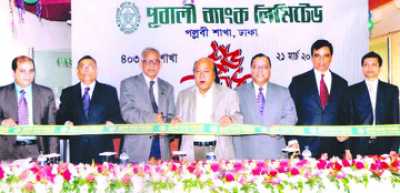Banking
The Chairman of Shahjalal Islami Bank Limited Alhaj Anwer Hossain Khan handed over a cheque
 The Chairman of Shahjalal Islami Bank Limited Alhaj Anwer Hossain Khan handed over a cheque worth Taka 1.0 million (10 lac) recently to Professor A A M S Arefin Siddique, Vice Chancellor of Dhaka University for supporting 46th Convocation of DU. Among others Controller of Examination of Dhaka University Baharul Haque Chowdhury and Head of PRD of the Bank Shamsuddoha Shimu were present on the occasion.
The Chairman of Shahjalal Islami Bank Limited Alhaj Anwer Hossain Khan handed over a cheque worth Taka 1.0 million (10 lac) recently to Professor A A M S Arefin Siddique, Vice Chancellor of Dhaka University for supporting 46th Convocation of DU. Among others Controller of Examination of Dhaka University Baharul Haque Chowdhury and Head of PRD of the Bank Shamsuddoha Shimu were present on the occasion.
Financial Express/Bangladesh/ 22th March 2012
Directors of Pubali Bank Ltd Hafiz Ahmed Mazumder, MP, formally inaugurating the Pallabi branch of the bank
 Chairman, Board of Directors of Pubali Bank Ltd Hafiz Ahmed Mazumder, MP, formally inaugurating the Pallabi branch of the Bank as the chief guest Wednesday. Director Sk Wahidur Rahman, Managing Director Helal Ahmed Chowdhury and Additional Managing Director M.A. Halim Chowdhury also seen.
Chairman, Board of Directors of Pubali Bank Ltd Hafiz Ahmed Mazumder, MP, formally inaugurating the Pallabi branch of the Bank as the chief guest Wednesday. Director Sk Wahidur Rahman, Managing Director Helal Ahmed Chowdhury and Additional Managing Director M.A. Halim Chowdhury also seen.
Financial Express/Bangladesh/ 22th March 2012
Merchant banks to pay higher corporate tax
Merchant banks will now have to pay 42.5 per cent in corporate tax instead of 37.5 per cent as the revenue board has decided to treat them as 'financial institutions', officials have said.
The officials of the National Board of Revenue (NBR) recently started issuing letters to different merchant banks instructing them to comply with its directive.
Among others, Benco Finance Investment has also got the letter from the NBR.
"We have been mistakenly treating those as private firms. But merchant banks fall under the category of financial institutions," a senior official at large tax payers unit (LTU) under the board's income tax wing told the FE Wednesday.
Former NBR chairman Muhammad Abdul Mazid said the central bank recently has come up with the definition of financial institutions (FIs) and as per the latest definition, merchant banks will be treated as 'financial institutions'.
"Lately, merchant banks are being upgraded due to their extended functions. That's why merchant banks will be treated as financial institutions," Mr. Mazid told the FE.
As private firms, merchant banks used to pay 37.5 per cent corporate tax under Section 82 of the income tax law.
"Both the NBR and the merchant banks did not look into the said Section of the income tax law, under which these banks will have to pay 42.5 per cent corporate tax," an NBR official told the FE.
He said the revenue board was contacting the merchant banks one after one to inform them that they would be treated as 'financial institutions' as per the law.
"We have given them a reminder that the law is being applied to them. They have also agreed to comply with the existing law in paying the corporate tax," the NBR official said.
Presently, a total of 50 merchant banks are running their business in the country's stock market.
When asked, different merchant banks have expressed their 'dissatisfaction' over the letter the NBR has sent to them.Merchant banks will now have to pay 42.5 per cent in corporate tax instead of 37.5 per cent as the revenue board has decided to treat them as 'financial institutions', officials have said.
The officials of the National Board of Revenue (NBR) recently started issuing letters to different merchant banks instructing them to comply with its directive.
Among others, Benco Finance Investment has also got the letter from the NBR.
"We have been mistakenly treating those as private firms. But merchant banks fall under the category of financial institutions," a senior official at large tax payers unit (LTU) under the board's income tax wing told the FE Wednesday.
Former NBR chairman Muhammad Abdul Mazid said the central bank recently has come up with the definition of financial institutions (FIs) and as per the latest definition, merchant banks will be treated as 'financial institutions'.
"Lately, merchant banks are being upgraded due to their extended functions. That's why merchant banks will be treated as financial institutions," Mr. Mazid told the FE.
As private firms, merchant banks used to pay 37.5 per cent corporate tax under Section 82 of the income tax law.
"Both the NBR and the merchant banks did not look into the said Section of the income tax law, under which these banks will have to pay 42.5 per cent corporate tax," an NBR official told the FE.
He said the revenue board was contacting the merchant banks one after one to inform them that they would be treated as 'financial institutions' as per the law.
"We have given them a reminder that the law is being applied to them. They have also agreed to comply with the existing law in paying the corporate tax," the NBR official said.
Presently, a total of 50 merchant banks are running their business in the country's stock market.
When asked, different merchant banks have expressed their 'dissatisfaction' over the letter the NBR has sent to them.
Financial Express/Bangladesh/ 22th March 2012
WB provides $ 79m for workforce development
Forty-five public and private training institutes on Wednesday signed an agreement to improve the skills of workers through the “Skills and Training Enhancement Project (STEP)”, a US$ 79 million operation supported by the World Bank (WB).
The director general, Directorate of Technical Education and the heads of the 45 Public-Private Institutes mutually signed the contracts. Education minister Nurul Islam Nahid was the chief guest at the programme while WB country director Ellen Goldstein was the special guest.
Under this initiative, public and private training institutions will be strengthened to improve the skills of the workforce. The project will focus on improving the Technical and Vocational Education and Training (TVET) system to develop high- quality workers who will be able to respond to the needs of both the domestic and international labour markets.
The project aims to strengthen the capacity of at least 30 polytechnic institutions and 50 short-term training providers to deliver high quality training. With this signing, already 22 polytechnic institutes and 45 short-term training providers have performance contracts to improve the quality of their services.
The project will also support about 160,000 student-years through “stipend for diploma” education and around 50,000 students will participate in short-term training courses.
“The government is looking forward to the implementation of this five-year project to provide Bangladesh with a growing cadre of skilled men and women,” the education minister said. He hoped that this project would aid in helping Bangladeshi workers to be accepted abroad as skilled manpower and contribute to the growth of the manufacturing and other sectors within the country.
“An increasingly skilled labour force will be vital to accelerate economic growth in Bangladesh and maintain the country’s competitive edge in global markets,” Ellen Goldstein said on this occasion. Bangladesh’s growing workforce supports key export industries and generates remittances that contribute a significant amount to the economy.
In 2010, Bangladesh was ranked as the 7th manpower exporting country and migrant workers remitted nearly US$ 11.6 billion in 2010-11 financial year.
The Independent/Bangladesh/ 22th March 2012
The government’s bank borrowing has started
The government’s bank borrowing has started to rise once again after a pause of two-month, signalling to fuel up inflation and non-availability of credits to the ailing private sector. The government borrowed Tk 17,738 crore from banks during the first eight and half months ((July 1 through March 15)) of this fiscal year, the central bank data shows.
This reflects significant shortfalls in foreign borrowing, higher-than-expected subsidy payments and lower than expected revenue earnings, officials explains.
After strong criticism from experts and businessmen, the government’s bank borrowing however came down to Tk 15,558 crore in February from all time high of Tk 21,000 crore in November.
The government had projected a target of their borrowing from banks in this year's budget at Tk 18,957 crore, which was exhausted in just four months and 17 days. However, the target has already been revised to more than Tk 25,000 crore.
This unproductive government borrowing was simply generating higher level of inflation in the economy. The economy is already under pressure of a persistent double-digit inflation, said analysts.
They also warned that huge government borrowing from commercial banks would not leave cheap money for the private sector to grow. The hope for low level interest rate in the next fiscal year will be evaporated.
The Bangladesh Bank in its half yearly monetary policy statement forecast 6.5 per cent to 7 per cent GDP (gross domestic product) growth for this fiscal year but the private sector participation may dip because of what the entrepreneurs said, “Extreme scarcity of funds”.
“If the country wants to keep the wheel of the country’s economy running, credit growth in the private sector should be kept above 20 per cent,” said AK Azad, president of Federation of Bangladesh Chambers of Commerce and Industries (FBCCI).
But, the way the government is borrowing from the banks, there will be an acute shortage in loanable fund for the private sector, which will lead to spiralling interest rate, he observed.
The monetary policy set by the central Bangladesh Bank also intended to a 16 per cent credit growth for private sector.
The central bank in its monetary policy said limiting government borrowing from the banking sector is essential for bringing inflation down to single digit.
To reduce reliance on bank borrowing, the government has already taken measures to cut subsidy on power and energy by raising fuel price. It has also raised interest rate on savings certificate.
Earlier this year, the International Monetary Fund had warned the government about excessive bank borrowing. It put a string attached with IMF’s extended credit facility to the government. IMF’s upcoming board meeting sometime in April may discuss the issue.
To ease pressure on the bank borrowings, IMF suggested that the government increases the fuel and electricity prices. The government has already complied.
In October, the World Bank also warned that the government's excessive borrowing from the banking sector will make the country's financial sector weak and ultimately dampen growth.
Explaining the macroeconomic pressures in the banking system, the WB said the government's increasing reliance on domestic financing is raising concerns on crowding out private investment. The report said, if the government continues to borrow heavily from the banking system, the debt in the private sector may fall much short of the expected level, which will not be consistent with achieving the GDP growth target.
A former Bangladesh Bank governor Dr Salehuddin Ahmed said bank borrowing by the government brings good in no way for the economy.
“It will fuel inflationary pressure further and hurt private sector credit growth,” he said.
Economists, politicians and businessmen recently at a programme organised by the Centre for Policy Dialogue (CPD) expressed deep concern over the government’s dependence on banks to meet budget deficit in the wake of dipping foreign aid.
They also said unlike the previous years, bank borrowing might affect the private sector this year as because the banks are severely suffering from fund crunch.
The Independent/Bangladesh/ 22th March 2012



